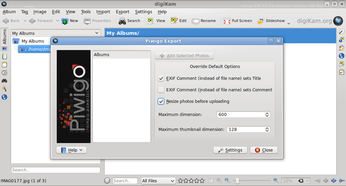Perfect Cloud-based Photo Setup with digiKam and Piwigo

Productivity Sauce
Using digiKam's Kipi plugins, you can upload your photos to a variety of popular photo services, including Flickr, Picasaweb, and SmugMug. But what if you want to host your own photo album and still be able to populate it with photos directly from within digiKam? In this case, you might want to try Piwigo, a nifty photo application that has everything you need to host and share your photos on the Web. Piwigo is supremely easy to install and get to grips with, and you can use the vast collection of available extensions and themes to customize the application to fit your specific needs. The best part is, though, that digiKam comes with the Piwigo upload plugin, so you can push your photos directly from the desktop photo management application to the Web album. To enable the plugin, launch digiKam, choose Settings | Configure digiKam, switch to the Kipi Plugins section, and enable the Remote Piwigo Export plugin. Press OK, and restart digiKam.
Before you can upload photos to Piwigo, you have to create at least one category. To do this, log in to Piwigo as an administrator and navigate to Administration | Categories | Manage. Create then a new virtual category. Uploading photos from digiKam to Piwigo is easy. Switch to digiKam, select the photos you want to upload, and choose Export | Export to Piwigo. Specify the required connection settings, and press OK. You can then upload the selected photos by pressing the Add Selected Photos button. Before you do that, though, it might be a good idea to enable and configure the Resize photos before uploading option, so the utility reduces the size of the selected photos to a more manageable size before uploading them.
comments powered by DisqusSubscribe to our Linux Newsletters
Find Linux and Open Source Jobs
Subscribe to our ADMIN Newsletters
Support Our Work
Linux Magazine content is made possible with support from readers like you. Please consider contributing when you’ve found an article to be beneficial.

News
-
Introducing matrixOS, an Immutable Gentoo-Based Linux Distro
It was only a matter of time before a developer decided one of the most challenging Linux distributions needed to be immutable.
-
Chaos Comes to KDE in KaOS
KaOS devs are making a major change to the distribution, and it all comes down to one system.
-
New Linux Botnet Discovered
The SSHStalker botnet uses IRC C2 to control systems via legacy Linux kernel exploits.
-
The Next Linux Kernel Turns 7.0
Linus Torvalds has announced that after Linux kernel 6.19, we'll finally reach the 7.0 iteration stage.
-
Linux From Scratch Drops SysVinit Support
LFS will no longer support SysVinit.
-
LibreOffice 26.2 Now Available
With new features, improvements, and bug fixes, LibreOffice 26.2 delivers a modern, polished office suite without compromise.
-
Linux Kernel Project Releases Project Continuity Document
What happens to Linux when there's no Linus? It's a question many of us have asked over the years, and it seems it's also on the minds of the Linux kernel project.
-
Mecha Systems Introduces Linux Handheld
Mecha Systems has revealed its Mecha Comet, a new handheld computer powered by – you guessed it – Linux.
-
MX Linux 25.1 Features Dual Init System ISO
The latest release of MX Linux caters to lovers of two different init systems and even offers instructions on how to transition.
-
Photoshop on Linux?
A developer has patched Wine so that it'll run specific versions of Photoshop that depend on Adobe Creative Cloud.

